人教版新目标八年级上册英语Unit 2 How often do you exercise? Section B (3a-self-check)课件(共33张PPT)
文档属性
| 名称 | 人教版新目标八年级上册英语Unit 2 How often do you exercise? Section B (3a-self-check)课件(共33张PPT) | 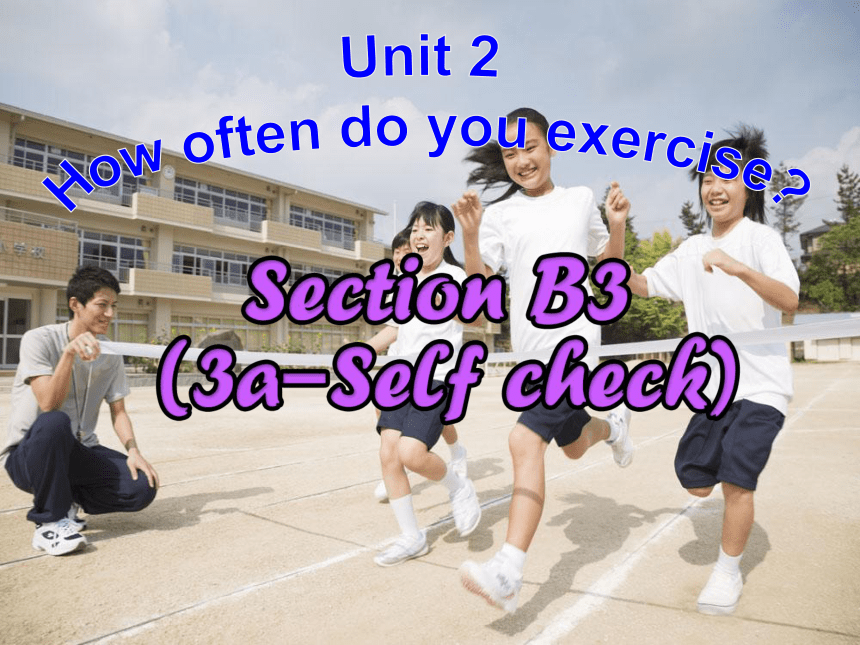 | |
| 格式 | zip | ||
| 文件大小 | 2.6MB | ||
| 资源类型 | 教案 | ||
| 版本资源 | 人教新目标(Go for it)版 | ||
| 科目 | 英语 | ||
| 更新时间 | 2020-07-30 19:45:13 | ||
图片预览

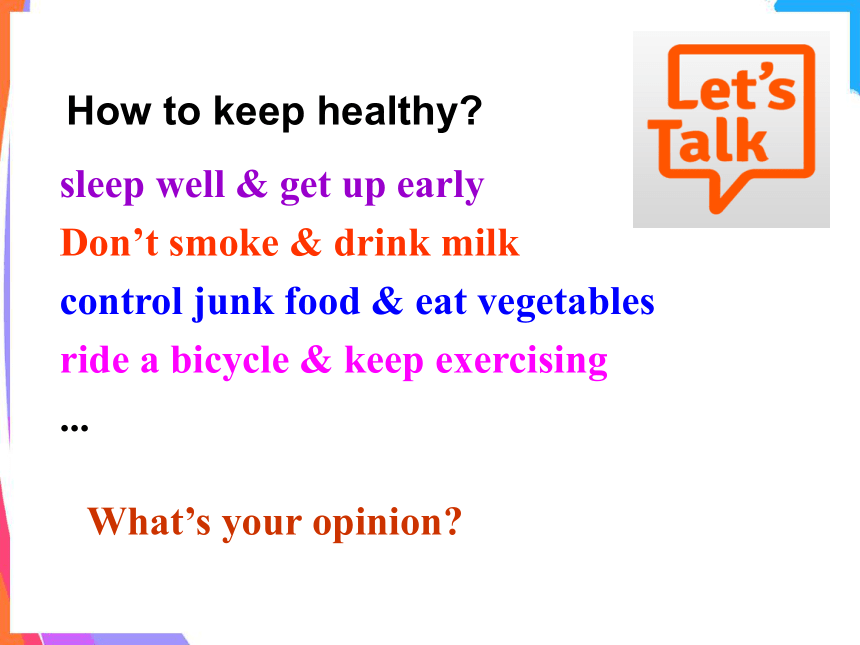
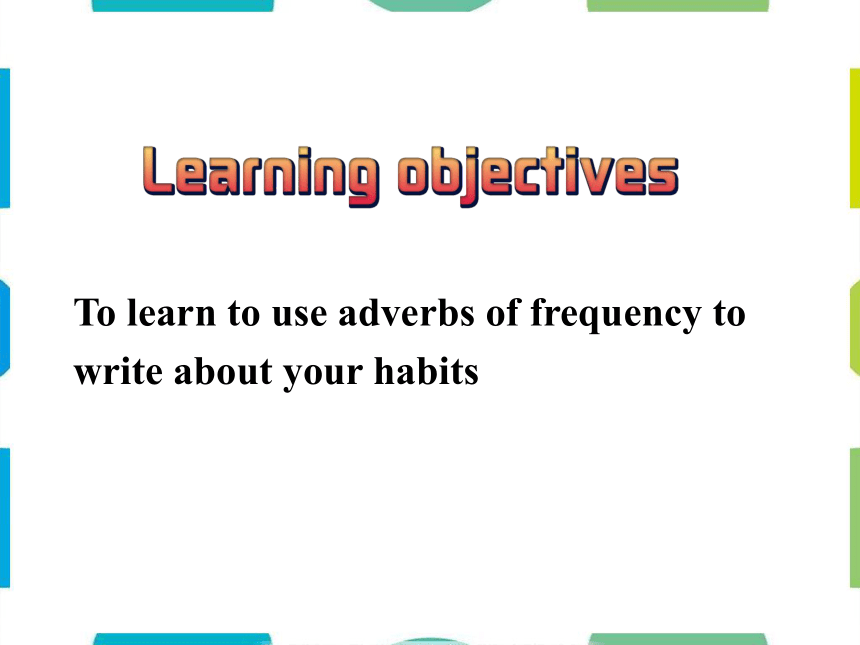

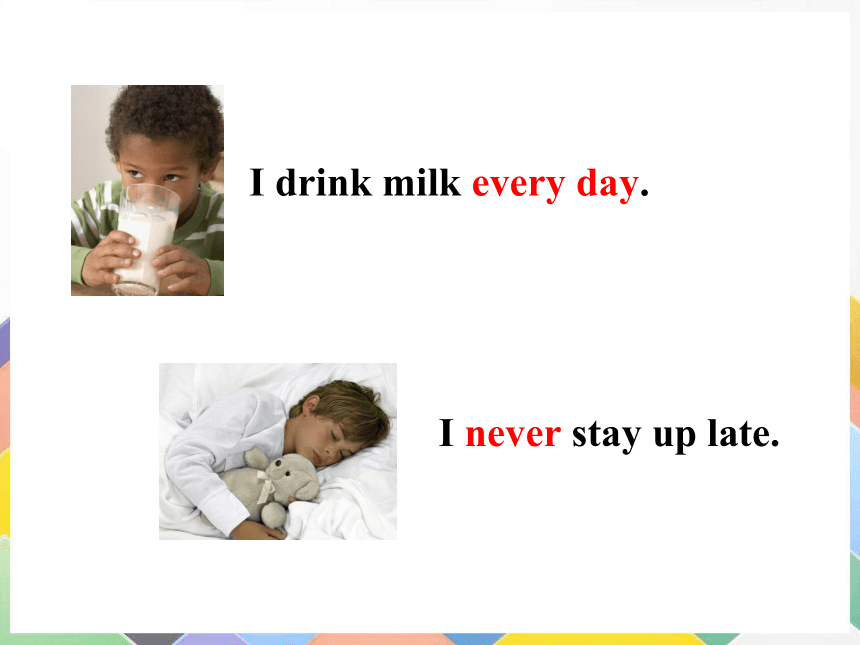
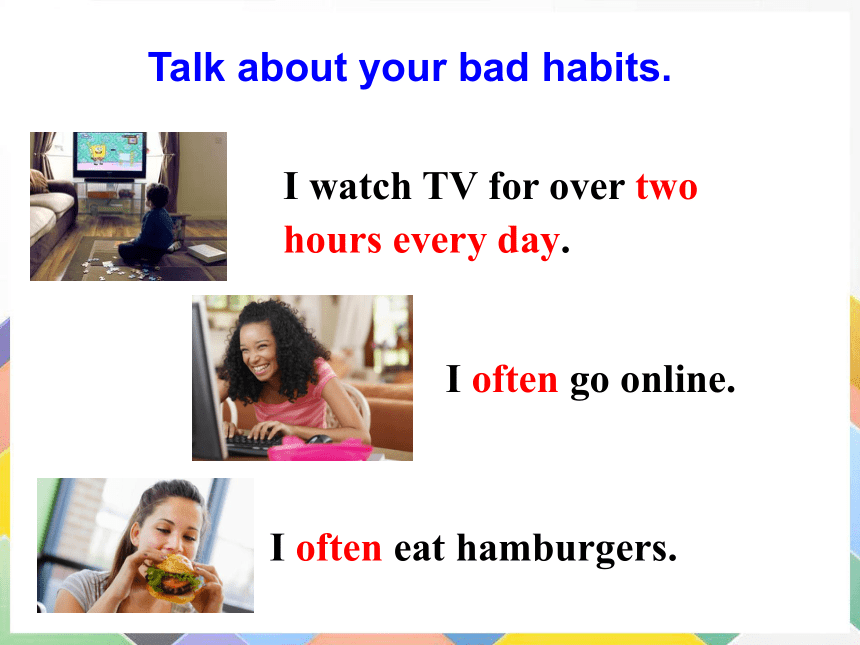

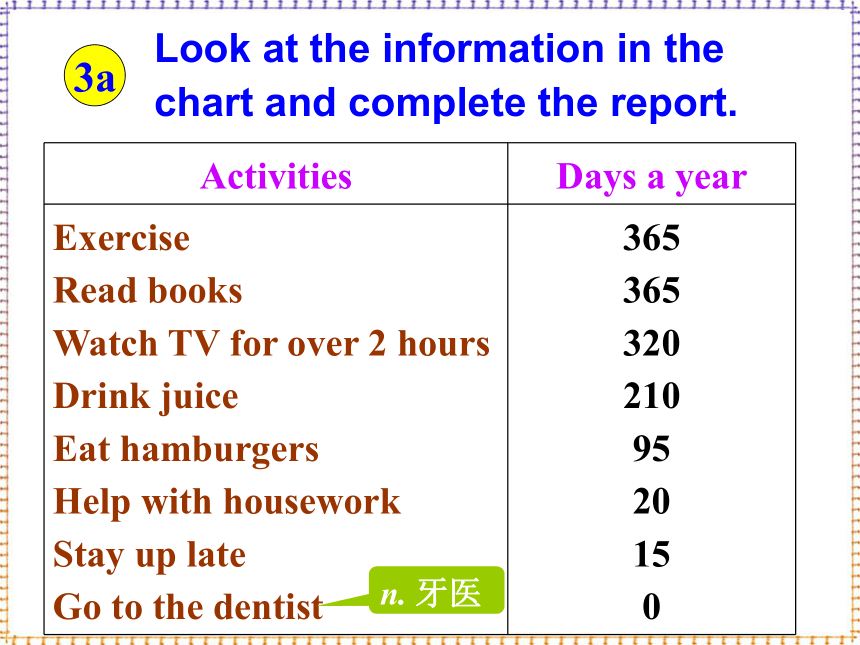
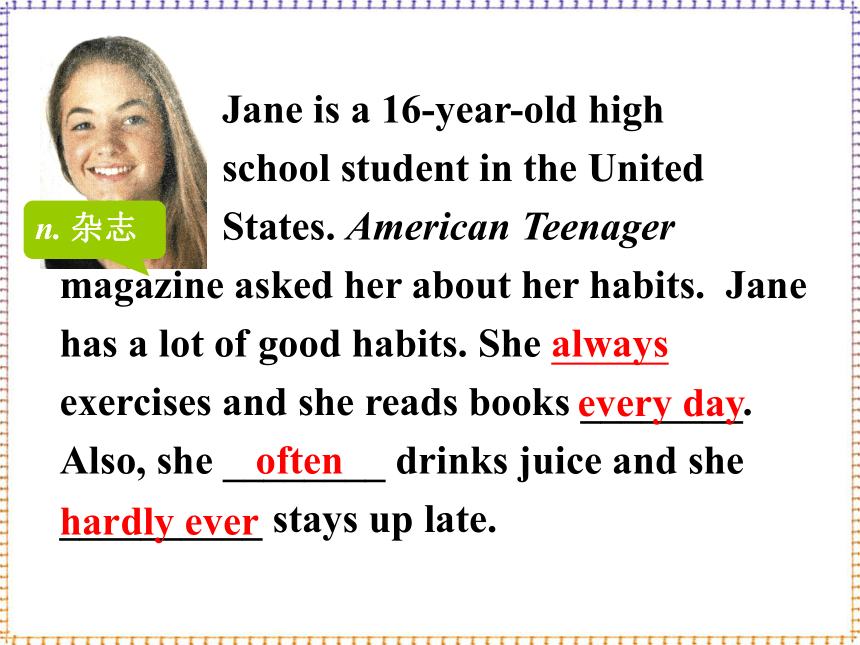
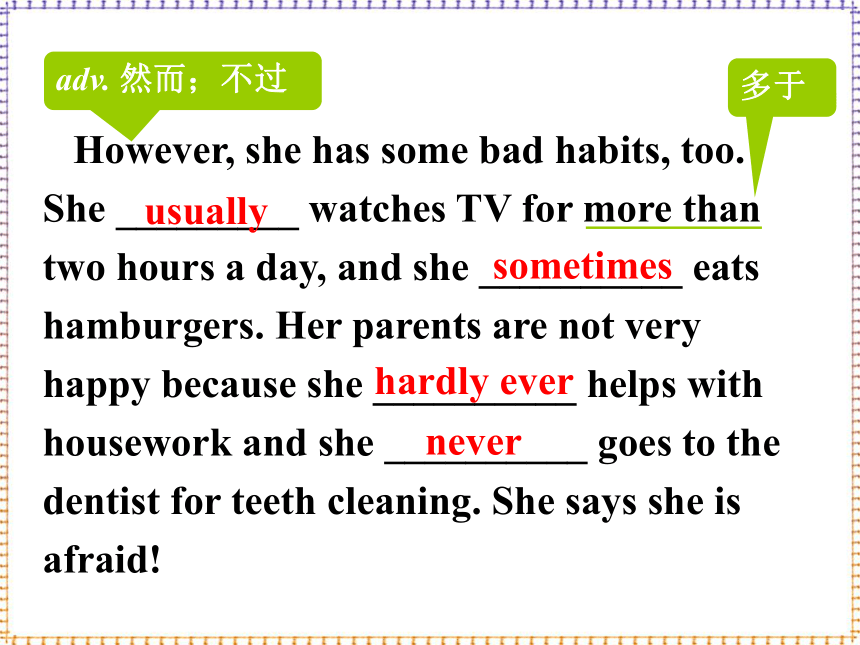
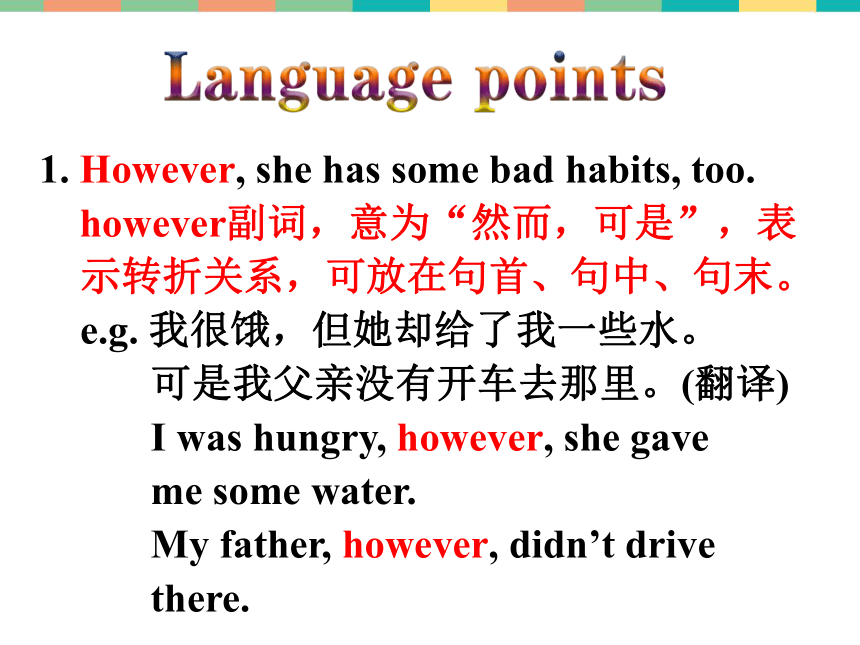
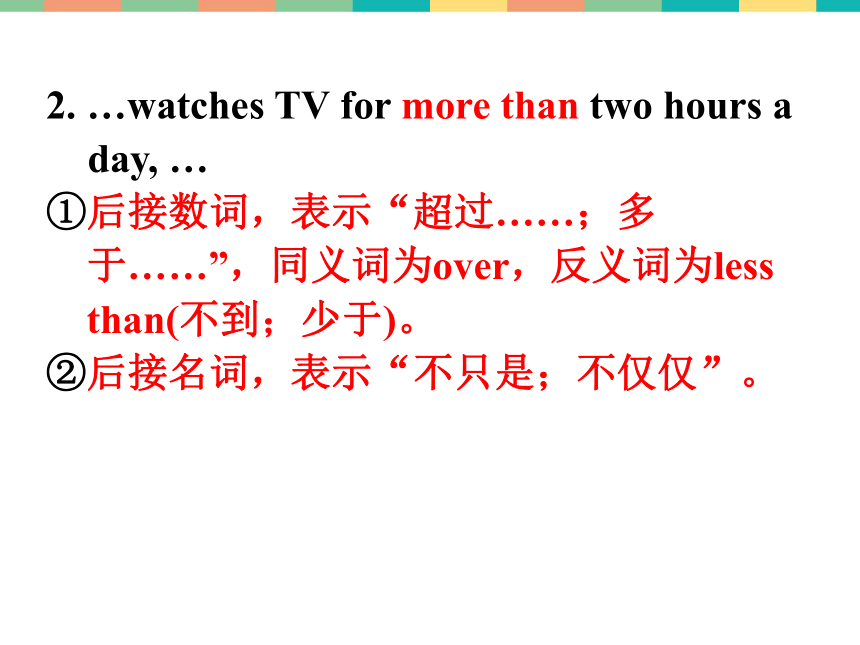
文档简介
(共33张PPT)
sleep
well
&
get
up
early
Don’t
smoke
&
drink
milk
control
junk
food
&
eat
vegetables
ride
a
bicycle
&
keep
exercising
...
What’s
your
opinion?
How
to
keep
healthy?
To
learn
to
use
adverbs
of
frequency
to
write
about
your
habits
Talk
about
your
good
habits.
I
read
English
books
every
day.
I
usually
help
with
the
housework.
I
always
exercise.
I
drink
milk
every
day.
I
never
stay
up
late.
Talk
about
your
bad
habits.
I
often
go
online.
I
often
eat
hamburgers.
I
watch
TV
for
over
two
hours
every
day.
I
hardly
ever
go
to
the
dentist
(看牙医).
I
don’t
like
vegetables.
Look
at
the
information
in
the
chart
and
complete
the
report.
3a
n.
牙医
Activities
Days
a
year
Exercise
Read
books
Watch
TV
for
over
2
hours
Drink
juice
Eat
hamburgers
Help
with
housework
Stay
up
late
Go
to
the
dentist
365
365
320
210
95
20
15
0
Jane
is
a
16-year-old
high
school
student
in
the
United
States.
American
Teenager
magazine
asked
her
about
her
habits.
Jane
has
a
lot
of
good
habits.
She
always
exercises
and
she
reads
books
________.
Also,
she
________
drinks
juice
and
she
__________
stays
up
late.
often
every
day
hardly
ever
n.
杂志
However,
she
has
some
bad
habits,
too.
She
_________
watches
TV
for
more
than
two
hours
a
day,
and
she
__________
eats
hamburgers.
Her
parents
are
not
very
happy
because
she
__________
helps
with
housework
and
she
__________
goes
to
the
dentist
for
teeth
cleaning.
She
says
she
is
afraid!
usually
sometimes
hardly
ever
never
adv.
然而;不过
多于
1.
However,
she
has
some
bad
habits,
too.
however副词,意为“然而,可是”,表示转折关系,可放在句首、句中、句末。
e.g.
我很饿,但她却给了我一些水。
可是我父亲没有开车去那里。(翻译)
I
was
hungry,
however,
she
gave
me
some
water.
My
father,
however,
didn’t
drive
there.
2.
…watches
TV
for
more
than
two
hours
a
day,
…
①后接数词,表示“超过……;多
于……”,同义词为over,反义词为less
than(不到;少于)。
②后接名词,表示“不只是;不仅仅”。
【运用】汉译英
(1)?苏州有着2500多年的历史。
(2017?江苏)
____________________________________________________________________________
(2)?我叔叔不只是一位老师。
______________________________________
Suzhou?has
a
history
of
more
than
/
over
2,500
years.
My
uncle
is
more
than
a
teacher.?
every
day
always
Complete
the
chart
with
your
own
information.
In
the
last
column,
use
expressions
like
always,
every
day,
twice
a
week
and
never.
3b
every
day
never
twice
a
week
Habits
Activities
How
often?
Good
habits
Exercise
Read
books
Eat
fruit
Drink
milk
Stay
up
late
always
often
twice
a
week
hardly
ever
never
Habits
Activities
How
often
Bad
habits
Watch
TV
for
over
2
hours
Use
the
Internet
Eat
hamburgers
Help
with
housework
Go
to
the
dentist
________________________________________
________________________________________
________________________________________
Write
a
report
about
your
good
and
bad
habits.
Say
how
often
you
do
things.
Use
the
report
in
3a
as
an
example.
3c
本文为写自己日常生活中的好习惯与坏习惯。因此,应用一般现在时态。
首先,将自己的好坏习惯列个清单,标明做这些事情的频率。
然后,依次将这些事情完整地表达。
最后,通读一遍文章,检查错误。
【任务】一、写出下列短语。
在周末
2.
去看电影
3.
几乎从不
4.
至少
5.
例如
6.
熬夜
7.
多于
8.
一点也不
on
weekends
go
to
the
movies
hardly
ever
at
least
such
as
stay
up
late
more
than
not…
at
all
三、写出与话题有关的词汇和句型。
常用词汇:
go
to
bed,
once
a
week,
play
sports,
want
sb.
to
do
sth.,
a
lot
of,
how
often,
…
句型:
How
often
do
you
exercise?
What
does
he
do
on
weekends?
How
many
hours
do
you
watch
TV
every
week?
It’s
good
to
relax
by
using
the
Internet
or
watching
game
shows.
What
kind
of
dance
are
you
learning?
写作技能指导:
提纲式作文,先提出论点,然后根据要点再分层详细阐述,在每部分可适当运用一些常用短语以使文章显得生动。
提出观点:Early
rising
is
good
for…
论证观点:First,
…
Second,
…
Third,
…
得出结论:
So
I
think
it’s
important
for
us
to….
One
possible
version
How
to
keep
healthy
I
think
a
healthy
lifestyle
can
help
us
to
be
strong
and
study
better.
So
I
choose
early
rising
to
keep
healthy.
It
is
good
for
us.
First,
early
rising
is
healthy
for
the
mind
and
the
body.
We
can
do
morning
exercises
to
keep
us
healthy.
It’s
also
good
to
breathe
the
fresh
air.
Second,
early
rising
helps
us
with
studies.
When
we
get
up
very
early
in
the
morning,
everything
around
is
quiet.
In
the
morning
we
can
learn
more
quickly
and
memorize
what
we
have
learnt
easily.
Third,
early
rising
gives
us
enough
time,
so
that
we
can
have
a
relaxing
breakfast.
So,
I
think
it’s
important
for
us
to
form
the
habit
of
getting
up
early.
1.
Complete
the
chart
with
activities
you
do
and
don’t
do.
What
about
your
mother/father?
play
basketball
play
chess
read
books
read
newspapers
eat
hamburgers
eat
chicken
drink
juice
drink
tea
watch
TV
use
the
Internet
stay
up
late
get
up
early
I
My
mother/father
always
usually
often
sometimes
hardly
ever
never
2.
Write
five
sentences
using
the
information
above.
5.
I
hardly
ever
watch
TV.
1.
I
always
play
basketball
after
school.
2.
My
father
always
plays
chess
on
weekends.
3.
I
usually
read
books
on
weekends.
4.
My
father
sometimes
drinks
tea.
6.
My
father
never
gets
up
early.
A:
What
do
Tom
and
Mike
__________
do
on
weekends?
B:
They
sometimes
go
to
the
museum.
A:
__________
do
they
go
to
the
shopping
center?
B:
__________
ever.
Maybe
about
twice
a
month.
usually
How
often
Hardly
3.
Fill
in
the
blanks
in
the
conversation.
A:
_________
do
they
watch
TV?
B:
Mike
never
watches
TV,
but
Tom
watches
TV
_________
day.
A:
Oh,
I’m
just
like
Tom.
I
_________
watch
TV,
too.
How
often
every
always
Ⅰ.?根据句意,从方框中选择恰当的单词填空,有的需要变换形式。
none,
magazine,
however,
dentist,
almost
1.
________
of
Jill’s
answers
are
right,
so
her
teacher
is
not
happy.
2.
Yesterday
she
didn’t
go
to
school.
________,
she
studied
by
herself
at
home.
3.
In
Mark’s
schoolbag,
I
found
two
new
________
about
popular
singers.
None?
However?
magazines
none,
magazine,
however,
dentist,
almost
4.
Yesterday
children
walked
________
eight
kilometers.
They
felt
very
tired.
5.
Those
two
________
are
friendly
to
me,
so
I
am
not
afraid
of
cleaning
my
teeth.
almost?
dentists
Ⅱ.?根据括号内所给提示词语,用完整的句子完成下列对话。
1.?A:?_______________________________?
(how
often)
B:?She
plays
volleyball
twice
a
week.
2.?A:?_______________________________?
(on
weekends)
B:?I
usually
go
fishing.
3.?A:?_______________________________?
(your
favorite
program)
B:?Animal
World.
How
often
does
she
play
volleyball
What
do
you
usually
do
on
weekends
What’s
your
favorite
program
4.?A:?How
often
does
your
father
go
to
the
countryside?
B:?____________________________________.
(once
a
month)
5.?A:?__________________________________?
(watch
TV)
B:?No,
they
don’t.
They
usually
walk
after
dinner.
He
goes
to
the
countryside
once
a
month
Do
they
usually
watch
TV
after
dinner
Do
a
survey
in
your
family,
using
the
questions
and
charts
in
Part
4.
Preview
the
new
words
and
expressions
in
Unit
3.
sleep
well
&
get
up
early
Don’t
smoke
&
drink
milk
control
junk
food
&
eat
vegetables
ride
a
bicycle
&
keep
exercising
...
What’s
your
opinion?
How
to
keep
healthy?
To
learn
to
use
adverbs
of
frequency
to
write
about
your
habits
Talk
about
your
good
habits.
I
read
English
books
every
day.
I
usually
help
with
the
housework.
I
always
exercise.
I
drink
milk
every
day.
I
never
stay
up
late.
Talk
about
your
bad
habits.
I
often
go
online.
I
often
eat
hamburgers.
I
watch
TV
for
over
two
hours
every
day.
I
hardly
ever
go
to
the
dentist
(看牙医).
I
don’t
like
vegetables.
Look
at
the
information
in
the
chart
and
complete
the
report.
3a
n.
牙医
Activities
Days
a
year
Exercise
Read
books
Watch
TV
for
over
2
hours
Drink
juice
Eat
hamburgers
Help
with
housework
Stay
up
late
Go
to
the
dentist
365
365
320
210
95
20
15
0
Jane
is
a
16-year-old
high
school
student
in
the
United
States.
American
Teenager
magazine
asked
her
about
her
habits.
Jane
has
a
lot
of
good
habits.
She
always
exercises
and
she
reads
books
________.
Also,
she
________
drinks
juice
and
she
__________
stays
up
late.
often
every
day
hardly
ever
n.
杂志
However,
she
has
some
bad
habits,
too.
She
_________
watches
TV
for
more
than
two
hours
a
day,
and
she
__________
eats
hamburgers.
Her
parents
are
not
very
happy
because
she
__________
helps
with
housework
and
she
__________
goes
to
the
dentist
for
teeth
cleaning.
She
says
she
is
afraid!
usually
sometimes
hardly
ever
never
adv.
然而;不过
多于
1.
However,
she
has
some
bad
habits,
too.
however副词,意为“然而,可是”,表示转折关系,可放在句首、句中、句末。
e.g.
我很饿,但她却给了我一些水。
可是我父亲没有开车去那里。(翻译)
I
was
hungry,
however,
she
gave
me
some
water.
My
father,
however,
didn’t
drive
there.
2.
…watches
TV
for
more
than
two
hours
a
day,
…
①后接数词,表示“超过……;多
于……”,同义词为over,反义词为less
than(不到;少于)。
②后接名词,表示“不只是;不仅仅”。
【运用】汉译英
(1)?苏州有着2500多年的历史。
(2017?江苏)
____________________________________________________________________________
(2)?我叔叔不只是一位老师。
______________________________________
Suzhou?has
a
history
of
more
than
/
over
2,500
years.
My
uncle
is
more
than
a
teacher.?
every
day
always
Complete
the
chart
with
your
own
information.
In
the
last
column,
use
expressions
like
always,
every
day,
twice
a
week
and
never.
3b
every
day
never
twice
a
week
Habits
Activities
How
often?
Good
habits
Exercise
Read
books
Eat
fruit
Drink
milk
Stay
up
late
always
often
twice
a
week
hardly
ever
never
Habits
Activities
How
often
Bad
habits
Watch
TV
for
over
2
hours
Use
the
Internet
Eat
hamburgers
Help
with
housework
Go
to
the
dentist
________________________________________
________________________________________
________________________________________
Write
a
report
about
your
good
and
bad
habits.
Say
how
often
you
do
things.
Use
the
report
in
3a
as
an
example.
3c
本文为写自己日常生活中的好习惯与坏习惯。因此,应用一般现在时态。
首先,将自己的好坏习惯列个清单,标明做这些事情的频率。
然后,依次将这些事情完整地表达。
最后,通读一遍文章,检查错误。
【任务】一、写出下列短语。
在周末
2.
去看电影
3.
几乎从不
4.
至少
5.
例如
6.
熬夜
7.
多于
8.
一点也不
on
weekends
go
to
the
movies
hardly
ever
at
least
such
as
stay
up
late
more
than
not…
at
all
三、写出与话题有关的词汇和句型。
常用词汇:
go
to
bed,
once
a
week,
play
sports,
want
sb.
to
do
sth.,
a
lot
of,
how
often,
…
句型:
How
often
do
you
exercise?
What
does
he
do
on
weekends?
How
many
hours
do
you
watch
TV
every
week?
It’s
good
to
relax
by
using
the
Internet
or
watching
game
shows.
What
kind
of
dance
are
you
learning?
写作技能指导:
提纲式作文,先提出论点,然后根据要点再分层详细阐述,在每部分可适当运用一些常用短语以使文章显得生动。
提出观点:Early
rising
is
good
for…
论证观点:First,
…
Second,
…
Third,
…
得出结论:
So
I
think
it’s
important
for
us
to….
One
possible
version
How
to
keep
healthy
I
think
a
healthy
lifestyle
can
help
us
to
be
strong
and
study
better.
So
I
choose
early
rising
to
keep
healthy.
It
is
good
for
us.
First,
early
rising
is
healthy
for
the
mind
and
the
body.
We
can
do
morning
exercises
to
keep
us
healthy.
It’s
also
good
to
breathe
the
fresh
air.
Second,
early
rising
helps
us
with
studies.
When
we
get
up
very
early
in
the
morning,
everything
around
is
quiet.
In
the
morning
we
can
learn
more
quickly
and
memorize
what
we
have
learnt
easily.
Third,
early
rising
gives
us
enough
time,
so
that
we
can
have
a
relaxing
breakfast.
So,
I
think
it’s
important
for
us
to
form
the
habit
of
getting
up
early.
1.
Complete
the
chart
with
activities
you
do
and
don’t
do.
What
about
your
mother/father?
play
basketball
play
chess
read
books
read
newspapers
eat
hamburgers
eat
chicken
drink
juice
drink
tea
watch
TV
use
the
Internet
stay
up
late
get
up
early
I
My
mother/father
always
usually
often
sometimes
hardly
ever
never
2.
Write
five
sentences
using
the
information
above.
5.
I
hardly
ever
watch
TV.
1.
I
always
play
basketball
after
school.
2.
My
father
always
plays
chess
on
weekends.
3.
I
usually
read
books
on
weekends.
4.
My
father
sometimes
drinks
tea.
6.
My
father
never
gets
up
early.
A:
What
do
Tom
and
Mike
__________
do
on
weekends?
B:
They
sometimes
go
to
the
museum.
A:
__________
do
they
go
to
the
shopping
center?
B:
__________
ever.
Maybe
about
twice
a
month.
usually
How
often
Hardly
3.
Fill
in
the
blanks
in
the
conversation.
A:
_________
do
they
watch
TV?
B:
Mike
never
watches
TV,
but
Tom
watches
TV
_________
day.
A:
Oh,
I’m
just
like
Tom.
I
_________
watch
TV,
too.
How
often
every
always
Ⅰ.?根据句意,从方框中选择恰当的单词填空,有的需要变换形式。
none,
magazine,
however,
dentist,
almost
1.
________
of
Jill’s
answers
are
right,
so
her
teacher
is
not
happy.
2.
Yesterday
she
didn’t
go
to
school.
________,
she
studied
by
herself
at
home.
3.
In
Mark’s
schoolbag,
I
found
two
new
________
about
popular
singers.
None?
However?
magazines
none,
magazine,
however,
dentist,
almost
4.
Yesterday
children
walked
________
eight
kilometers.
They
felt
very
tired.
5.
Those
two
________
are
friendly
to
me,
so
I
am
not
afraid
of
cleaning
my
teeth.
almost?
dentists
Ⅱ.?根据括号内所给提示词语,用完整的句子完成下列对话。
1.?A:?_______________________________?
(how
often)
B:?She
plays
volleyball
twice
a
week.
2.?A:?_______________________________?
(on
weekends)
B:?I
usually
go
fishing.
3.?A:?_______________________________?
(your
favorite
program)
B:?Animal
World.
How
often
does
she
play
volleyball
What
do
you
usually
do
on
weekends
What’s
your
favorite
program
4.?A:?How
often
does
your
father
go
to
the
countryside?
B:?____________________________________.
(once
a
month)
5.?A:?__________________________________?
(watch
TV)
B:?No,
they
don’t.
They
usually
walk
after
dinner.
He
goes
to
the
countryside
once
a
month
Do
they
usually
watch
TV
after
dinner
Do
a
survey
in
your
family,
using
the
questions
and
charts
in
Part
4.
Preview
the
new
words
and
expressions
in
Unit
3.
同课章节目录
- Unit 1 Where did you go on vacation?
- Section A
- Section B
- Unit 2 How often do you exercise?
- Section A
- Section B
- Unit 3 I'm more outgoing than my sister.
- Section A
- Section B
- Unit 4 What's the best movie theater?
- Section A
- Section B
- Unit 5 Do you want to watch a game show?
- Section A
- Section B
- Unit 6 I'm going to study computer science.
- Section A
- Section B
- Unit 7 Will people have robots?
- Section A
- Section B
- Unit 8 How do you make a banana milk shake?
- Section A
- Section B
- Unit 9 Can you come to my party?
- Section A
- Section B
- Unit 10 If you go to the party, you'll have a grea
- Section A
- Section B
